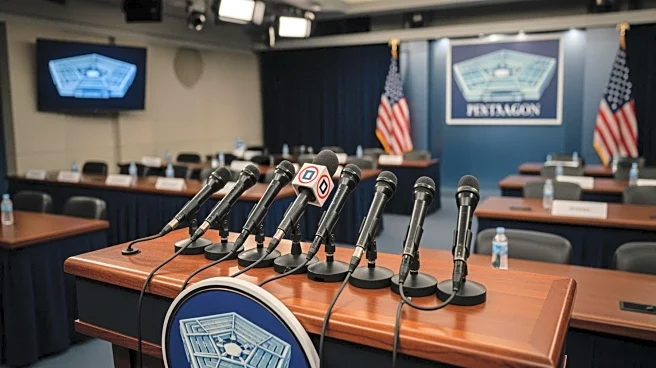What's Happening?
The Pentagon press corps is experiencing significant changes as restrictions imposed by the Trump administration have led to the removal of journalists from the building. These new rules, described as 'common
sense' by Defense Secretary Pete Hegseth, include wearing badges and limiting access to certain areas. However, journalists argue that these measures compromise their ability to gather news and infringe on First Amendment rights. The restrictions have resulted in the confiscation of press badges and the departure of journalists, who have been critical of the administration's approach to media access. The changes are seen as a move to limit scrutiny of the Department of Defense's operations and spending.
Why It's Important?
The restrictions on the Pentagon press corps have broader implications for transparency and accountability in government. By limiting media access, the public's ability to receive timely and accurate information about military operations and spending is compromised. This move could affect public trust in the government and its handling of national security matters. Additionally, the restrictions may set a precedent for other government agencies, potentially leading to reduced media access across various sectors. The situation highlights the ongoing tension between the Trump administration and the press, raising concerns about the future of press freedom in the U.S.
What's Next?
As journalists adapt to these new restrictions, they may seek alternative methods to report on military affairs, potentially relying more on sources outside the Pentagon. News organizations may also challenge the restrictions legally, arguing that they violate constitutional rights. The situation could lead to increased advocacy for press freedom and transparency, with potential involvement from civil society groups and legal experts. The impact of these restrictions may also be felt in other areas of government, prompting discussions on the balance between security and transparency.
Beyond the Headlines
The restrictions on the Pentagon press corps may have long-term implications for the relationship between the media and the government. The move could lead to a shift in how journalists cover military affairs, with increased reliance on unofficial sources and social media. This change may affect the quality and depth of reporting, as well as public perception of military operations. Additionally, the situation raises ethical questions about the role of the press in holding government accountable and the importance of maintaining open channels of communication between the media and government officials.









